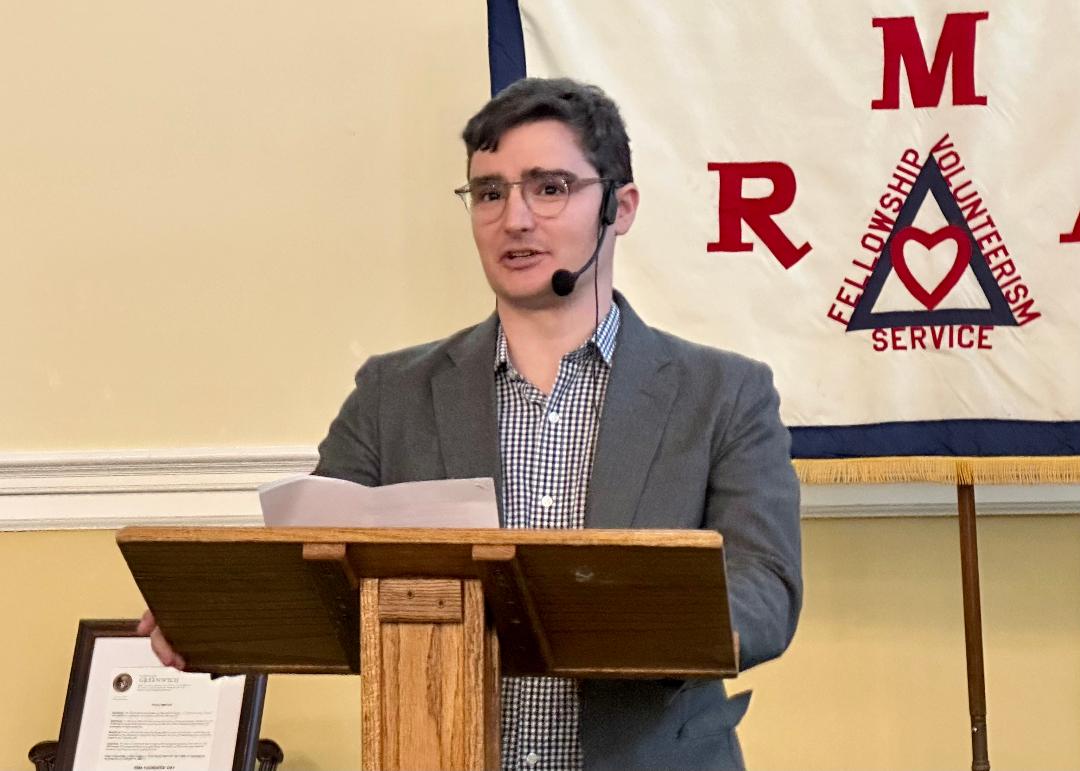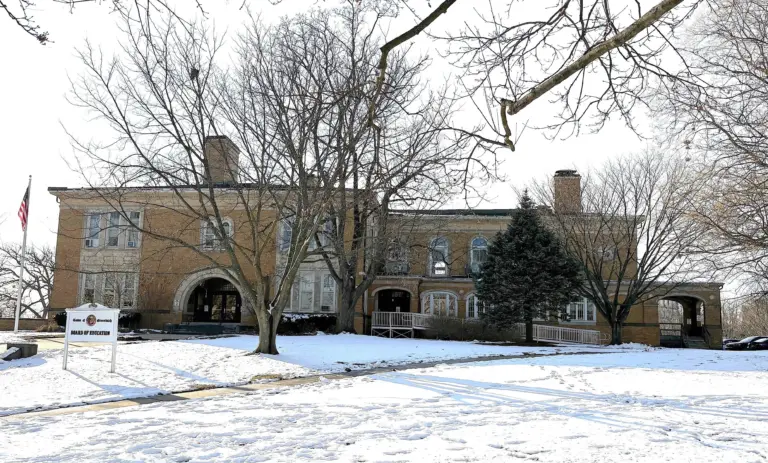
By John Reese
At the RMA meeting on February 21, Stuart Reid spoke about his new book The Lumumba Plot, which investigates the dramatic rise and demise of Patrice Lumumba, Congo’s first democratically elected leader after the country gained independence from brutal Belgian rule in June 1960.
Reid began by outlining Belgium’s wretched colonial legacy in Congo. Initially, King Leopold II ran Congo as his own private estate for profit, but international outcry over atrocities forced the Belgian government to annex the territory as an official colony in 1908. The Belgians subsequently prevented any development of an educated African elite in order to avoid calls for independence – there was an infamous saying: “no elites, no problems.”
It was within this restricted environment that the remarkably self-taught Patrice Lumumba emerged in the late 1950s as an influential member of various cultural groups agitating for independence. He honed his political skills while working as a beer salesman in urban bars and in 1958 co-founded the Congolese National Movement party (MNC). However, everything accelerated quickly in early 1959 when riots erupted in the capital city of Leopoldville. As African colonies elsewhere gained independence and faced anti-colonial unrest, Belgium hastily arranged for Congo’s independence to appease growing nationalist pressure.
Elections were quickly organized in May 1960 and the magnetic Lumumba won the most votes, becoming prime minister of an extraordinarily diverse coalition government. With only 20 Congolese university graduates in the entire world, and only two in its government, the woefully inexperienced cabinet faced the monumental task of shepherding the country to independence with little preparation and guidance. Despite a bold, aggressive independence day speech in front of a startled King Baudouin, critiquing Belgian atrocities, the first few days brought cautious optimism that an orderly transition of power could still be managed.
Those hopes evaporated in early July 1960 as Congo plunged into chaos just a week after independence. The Congolese army rank-and-file mutinied against the all-white Belgian officers in anger over persistent racial inequalities, triggering a broader revolution and flight of nearly all Europeans running core government services. Meanwhile, Congo’s mineral-rich southeastern province of Katanga took advantage of the loss of control by unilaterally declaring independence.
Desperate to save the disintegrating country, Prime Minister Lumumba requested UN peacekeeping support and blocked Katangan secession attempts. But his appeals to the UN Secretary General and then the Eisenhower administration failed. A pivotal White House meeting on August 18 apparently saw President Eisenhower directly order the CIA to assassinate Lumumba over concerns about Soviet influence and personal annoyance, marking the only known instance of an American president apparently requesting a foreign leader’s assassination, albeit an unsuccessful one (by poisoning).
With UN peacekeepers refusing to help stabilize Katanga by force, Lumumba turned to the Soviet Union in hopes of regaining control. But rather than securing military aid, this request simply provided justification for his opponents in Washington and Leopoldville to actively plot Lumumba’s demise. In September 1960, Lumumba’s one-time close friend and mentee Joseph Mobutu seized power in a coup tacitly endorsed by CIA station chief Larry Devlin. The pro-Western Mobutu confined his former mentor to house arrest under UN guard.
With President-elect Kennedy potentially more open to working with Lumumba, Mobutu aimed to permanently neutralize the perceived Communist threat before the January 20th inauguration. In mid-January 1961 Devlin learned of, yet kept superiors uninformed about Mobutu’s plan to lethally dispose of Lumumba outside the capital. Lumumba was subsequently transported to the secessionist Katanga province and killed by firing squad on January 17, just three days before Kennedy assumed office.
Over the next few years, CIA assistance helped Mobutu steadily suppress various rebellions and ultimately consolidate dictatorial authority by 1965 with enthusiastic US backing. As the country deteriorated under his extraordinarily corrupt and repressive misrule over the next 30 years, persistent US support for the loyal Cold War autocrat set the stage for state collapse and catastrophic civil war after Mobutu was finally ousted in 1997 by rebel forces.
In conclusion, Reid argued that the tragic decision to prioritize Mobutu over Lumumba in 1960-61 despite more moderate options still haunts the deeply troubled Democratic Republic of the Congo today. Instability and outside interference from that period forward have continued entrenching poverty and conflict ever since.
Stuart’s talk was followed by a lively question & answer session.
The talk can be viewed by going to the RMA website at https://greenwichrma.org, and clicking on “Speakers.”
The RMA’s upcoming presentation, “How Greenwich Communities Can Save Greenwich from Overdevelopment,” by Sam Romeo and Tony Johnson, is scheduled for 11 AM on Wednesday, March 6, 2024. Affordable Housing is one of the most controversial issues in Greenwich (and everywhere else!). NIMBY (Not in My Backyard) has become BANANA (Build Absolutely Nothing Anywhere Near Anybody). Residents are told to fear loss of “local control” due to 8-30g “mandates.” Hear how Sam and Tony are confronting the many objections and obstacles. Get answers to your toughest questions. Attend in person or by Zoom when Sam and Tony explain “How Greenwich Communities Can Save Greenwich from Overdevelopment.”
Sam Romeo is the chairman of Greenwich Communities. He has occupied leadership positions on the Greenwich RTM and RTC for over 20 years, has served as ombudsman for the State of Connecticut Department of Social Services, and as a member of the board of directors for Greenwich Emergency Medical Services. He has owned and operated his own business—Command Packaging Supply Products—for the past 30 years. Mr. Romeo is a lifelong resident of Greenwich.
Tony Johnson, CEO of Greenwich Communities, is a real estate professional with experience in managing and developing public and affordable housing, and commercial and residential real estate. He is experienced in all aspects of real estate including HUD regulations, accounting/finance, feasibility studies, strategic planning, deal negotiation, construction, bond issuance/financing, tax credit financing, and mixed finance development and strategy implementation. He is a graduate of the Harvard University Graduate School of Design, Pace University, and Loyola University Chicago.
To stream the presentation by Sam Romeo and Tony Johnson at 11 AM on Wednesday, March 6, click on https://bit.ly/30IBj21. This presentation will also be available on local public access TV channels, Verizon FIOS channel 24 and Optimum (Cablevision) channel 79.
Note: The views expressed in these presentations are those of the speakers. They are not intended to represent the views of the RMA or its members.
RMA speaker presentations are presented as a community service at no cost to in-person or Zoom attendees, regardless of gender. Any member of the public who would like to receive a weekly email announcement of future speakers should send a request to members@greenwichrma.org. The RMA urges all eligible individuals to consider becoming a member of our great organization, and thereby enjoy all the available fellowship, volunteer, and community service opportunities which the RMA offers to its members. For further information, go to https://greenwichrma.org/, or contact members@greenwichrma.org.



